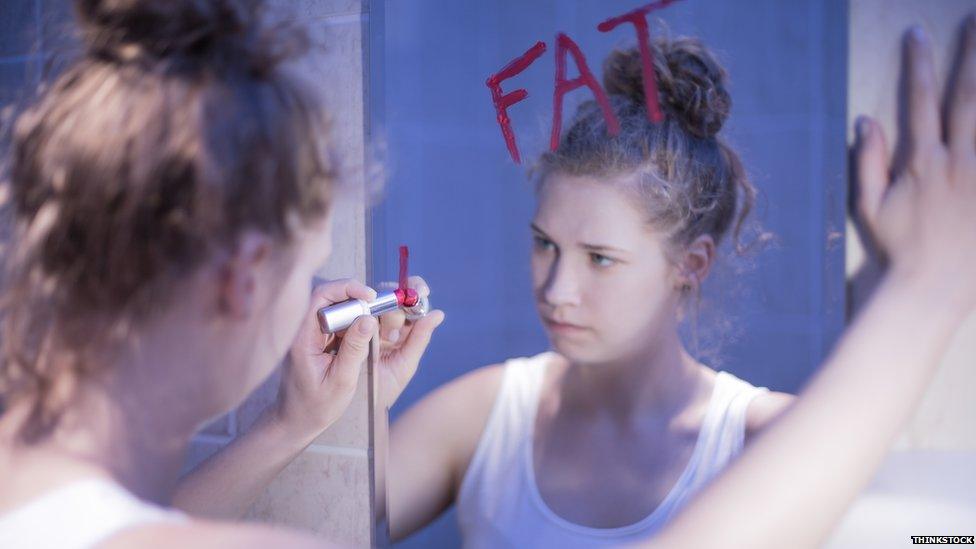Most eating disorder patients think GPs don't know enough, Beat survey suggests
- Published
Most young people with eating disorders say their GPs don't know how to help them, according to a survey by Beat.
The charity is warning a worrying number switch doctors and referrals to specialists can take far too long.
Laura, 22, says: "I was told to, 'Just eat.' They clearly didn't understand anorexia."
GPs say "intense" workloads and time pressures can make it difficult to diagnose an eating disorder which can be "very complex".
Beat says while many GPs provide good care, many do not, and the problem needs addressing.
It's thought more than 1.6 million people in the UK are directly affected by eating disorders.
The majority of patients are aged between 14 and 25.
Mental health experts say early intervention is critical for patients to make the best recovery.

The Department of Health argues all GPs receive core mental health training
The UK charity Beat spoke to nearly 1,700 people, who either had an eating disorder or were close to someone who had.
The survey suggests one in three felt their GP knew how to help them and one out of six switched doctors.
Beat's CEO Andrew Radford says: "It takes great courage for someone who has an eating disorder to come forward and often GPs are the first person they talk to.
"They are the gatekeepers of NHS care, but sufferers are being turned away when they should be being referred for specialist treatment from a mental health service.
"This isn't about blaming GPs, it's about enabling the 50 per cent of GPs who didn't provide good care to be as supportive of eating disorder sufferers as the 50 per cent who did."
'I wasn't skinny enough'
At 16, Laura from Cheshire was "15 stone and miserable", so she started dieting.
By the time she was 22, she had lost so much weight she was told she was would almost certainly need hospital treatment.
She was so weak she could not get out of bed and she refused to wear nail varnish or jewellery in case it made her heavier.
While Laura's eating disorder was intensifying, she visited her local doctor.
"Despite talking to my GP about feeling out of control with my eating, they weighed me and said I was not skinny enough to be classed as anorexic," she says.
"By the time I did weigh enough to be classed as anorexic, the waiting list for therapy was months long and I was completely encased in the disease.
"Perhaps if I had been referred to therapy earlier, it would not have got so bad?
"Online communities, internet articles, books and documentaries have been my saving grace, they are what make me feel supported and like there is hope."
What should change?
Beat is calling for medical students who want to become GPs to receive more training about eating disorders.
One junior doctor says she received two hours training during five years of studying.
"Medical schools and places where doctors go to specialise in general practice need to make sure GPs exit their training able to understand how to spot the early signs of an eating disorder and what to do," explains Beat's Andrew Radford.
But the Royal College of General Practitioners believes the real problem is the "intense pressure GPs are under".
Chair Professor Helen Stokes-Lampard, who's also a GP, says: "We are highly trained to take into account the physical, psychological and social factors affecting a patient when making a diagnosis and developing a treatment plan.
"With complex patients, this simply isn't possible within the constraints of the standard 10-minute consultation."
The RCGPs wants more money invested into general practice.
They say this would increase the number of GPs, which would mean they'd be able to spend more time with their patients.
The Department of Health says all GPs receive core mental health training including identifying and treating people with eating disorders.
It says it is working hard to improve referral waiting times by investing £150m into improving services.
Find us on Instagram at BBCNewsbeat, external and follow us on Snapchat, search for bbc_newsbeat, external